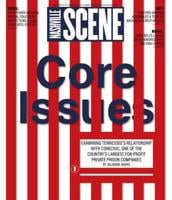On Sept. 6, dozens of people gathered at the Ellington Agricultural Center for one of 10 town halls across the state to discuss the forthcoming A-F school accountability system. The system, which was originally intended to be incorporated during the 2017-2018 school year, will synthesize academic data to assign each school a letter grade, providing snapshots of its performance.
Several Metro Nashville Public Schools staff attended the meeting to question Tennessee Department of Education chief of staff Chelsea Crawford. Though Tennessee’s new education commissioner, Lizzette Gonzalez Reynolds, did attend at least one other town hall, she did not appear to attend the Sept. 6 event — she did speak in Nashville earlier that day at a summit for the State Collaborative on Reforming Education, former U.S. Sen. Bill Frist’s pro-charter organization.
In 2016, the Tennessee General Assembly passed legislation requiring that schools be assigned an A, B, C, D or F letter grade. The law states that the grades must factor in student performance as determined by standardized testing, as well as student growth, which is measured in part through the Tennessee Value-Added Assessment System. The TDOE can also determine other factors to include in these scores, such as absenteeism or graduation rates. Former Tennessee Education Commissioner Penny Schwinn attributed the system launch’s multiyear delay to testing issues and later the COVID-19 pandemic. Though the TDOE already had a model, the state never rolled it out. The first round of letter grades will be released this fall, using last year’s data.
“There seems to be a rush to put a model in place without any of us really understanding what it’s gonna be,” said MNPS chief of academics and schools Mason Bellamy. “That’s a little concerning to me in that it’s been a law for seven years now, and now there seems to be a rush to implement in a way that wasn’t the case originally.”
Many commenters at the town hall emphasized the need to consider student growth in accountability scores — it’s a factor that’s required by law, but it’s unclear how heavily it will be included in this process. Schools that serve high-needs student populations, such as economically disadvantaged students, often have lower achievement scores because of realities that exist outside the classroom. If a student doesn’t have stable housing, for example, they’re likely not able to perform as well as their peers who have a consistent home or those whose families have extra resources for outside tutoring. As such, growth scores can better indicate how a school is serving students whose adverse childhood experiences may affect their education.
As Metro begins another school year, we take a look at student safety, infrastructure needs and more
At the event, MNPS parent Ashley Gish noted that she’d like to see detailed metrics that consider how schools serve students with disabilities, or how they engage families. Parent Francisco Moreno expressed a desire for a straightforward rating system that is easy to understand.
Crawford confirmed at the town hall that the state accountability system will be separate from the federal accountability system — some commenters expressed concern about that. She also noted that, while federal accountability systems provide resources for low-performing schools, the state system is not designed to do that.
There’s a lot of criticism about how the TDOE is handling the rollout. There are timing concerns, particularly around the quick rollout that leaves districts little time to understand and appeal the new calculation despite years of preparation. Some claim the new system is a way to encourage the distribution of education savings accounts, a program pushed by Gov. Bill Lee in which families can use public money to attend private schools. If schools have low accountability scores, it creates more incentives for families to seek other options like charter schools or ESAs. Tennessee’s former executive director of accountability, Mary Batiwalla, questioned the whole process on X (formerly Twitter), suggesting that it’s being influenced by former Florida Gov. Jeb Bush’s pro-voucher education nonprofit ExcelinEd, where Commissioner Reynolds formerly worked.
The TDOE’s window for public feedback closes on Sept. 15. Those wishing to submit comments can find more information on the TDOE’s website, or send comments to schoollettergrades@tnedu.gov.






